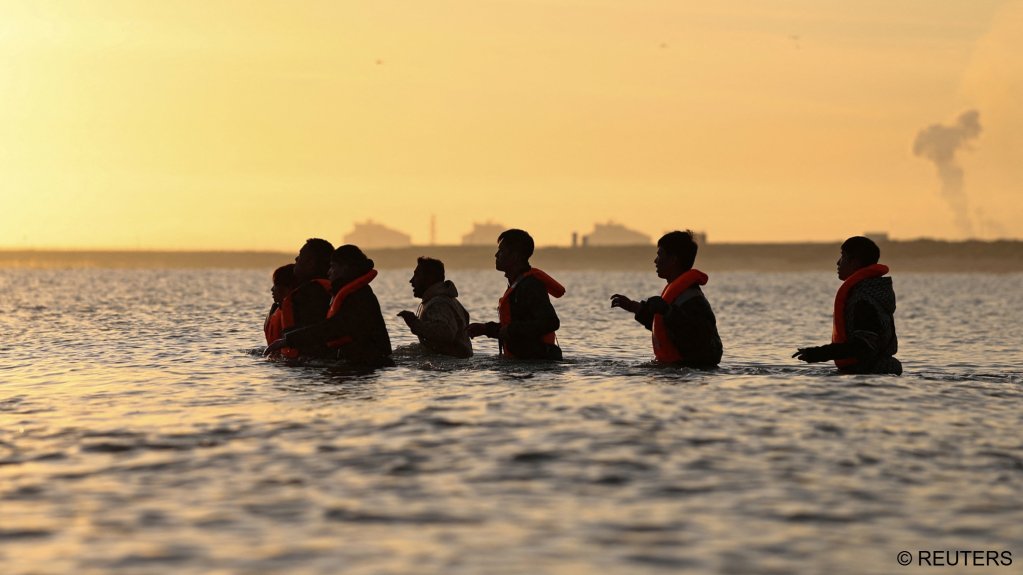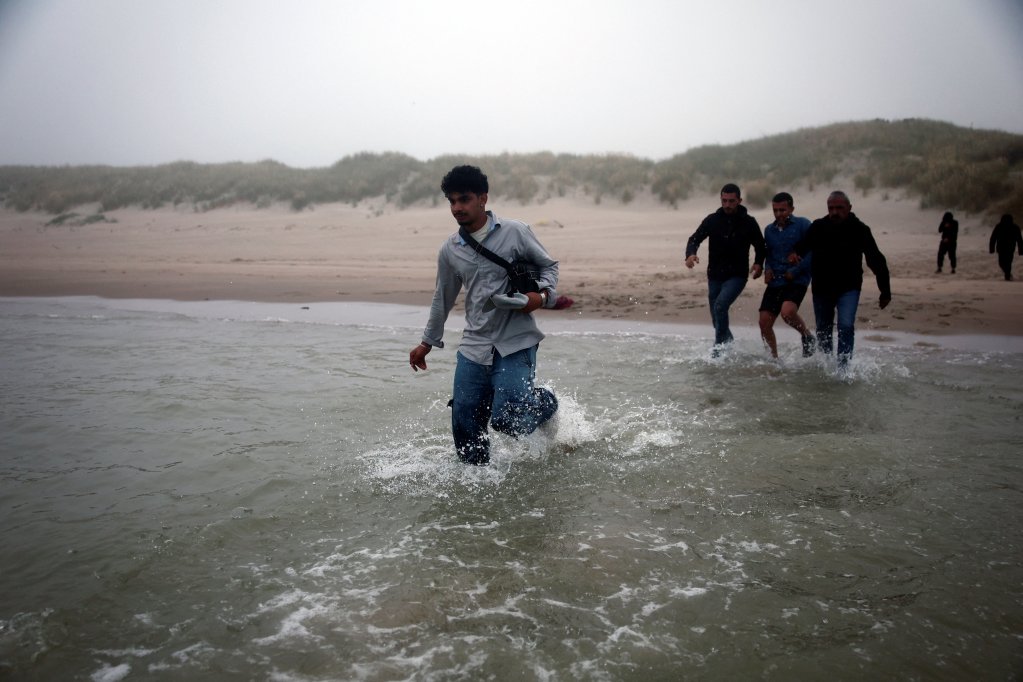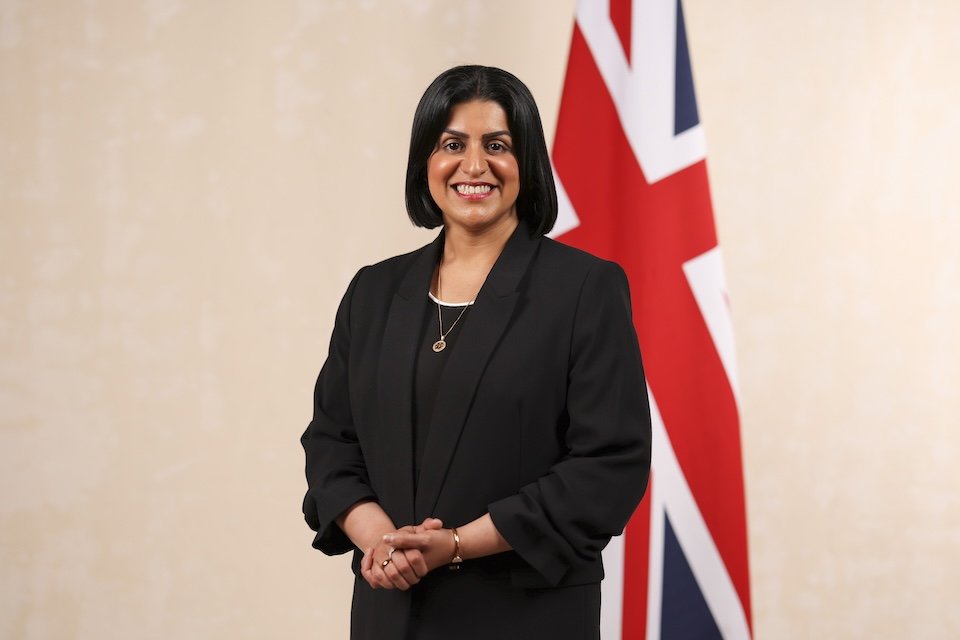More than 1,100 migrants crossed the Channel in small boats towards Britain over the weekend, as an Iranian man became the third migrant returned to France under the British-French ‘one in, one out’ deal. Meanwhile, migrants in Calais told reporters the deal wouldn’t change their determination to reach the UK.
British government data shows that 1,157 migrants crossed the Channel in small boats between September 19 and September 21. A total of 13 boats arrived on Friday (September 19), and one, carrying 85 people reached the UK’s south coast on Saturday (September 20).
The arrivals came as the British government announced they had successfully sent a third migrant, an Iranian national, back to France on Friday, as part of the 'one in, one out' deal that came into effect on August 5 but only actually began in practice last week.
As of Saturday, the French government was due to begin sending migrants to Britain as part of the reciprocal deal, but hasn’t yet announced if any have actually been exchanged.
Read AlsoUK: Hotels used as a 'contingency measure' to house asylum seekers amid record arrivals
Deal has little effect on migrants' decision making
Meanwhile, reporters with the French news portal France Bleu were in Calais on Monday, talking to migrants waiting to cross the Channel. They told reporters that although they knew about the deal, they "didn’t care" about it. "If we need to leave, we will leave, what they say about having the correct papers, and applying for a legal route properly, doesn’t interest me. It is all just talk [bla bla]," said a 30-year-old Syrian man named as Ahmed.

Ahmed arrived in Calais in August this year and had already made one failed attempt aboard a semi-rigid inflatable Zodiac dinghy, he told France Bleu. Three people died during the crossing, he said -- two Vietnamese men and an Egyptian.
A crossing on September 10, off the coast of Sangatte, did indeed result in deaths. "They didn’t die in the water," said Ahmed, but in the boat "because there were too many people and not enough places, there was a mixture of water and fuel at the bottom of the boat."
Even this experience has not put Ahmed off. He reportedly told France Bleu, "I will try again for sure."
Read AlsoChannel: At least four migrants die in crossing attempts in two days
Applying for legal routes has too many obstacles, think aid organizations
A group of men eating food distributed by an aid organization a little further up the coast from Ahmed told reporters at France Bleu that they had filled in forms for the French authorities, hoping to be among those sent to the UK as part of the accord, but they hadn’t yet received a response.
Some unnamed representatives from the aid organizations operating in Calais told France Bleu that they thought the system was not really workable. They said to fill in the French government forms to be on the list, people needed a passport, or other valid document to prove their identity. They would also need a secure internet connection and to be properly registered in France. The aid groups believe these requirements put a brake on most of the people waiting clandestinely on the French coasts to make a crossing, and therefore wouldn’t reduce the numbers still hoping to cross, as they see no other option.

Nevertheless, the British government announced over the weekend that it hopes to ramp up the deal as soon as possible. A recent report by a UK think tank, British Future, made claims that if the deal was scaled up sufficiently, it could result in as much as a 75 percent reduction in the number of crossing attempts.
However, to date, the British government has only managed to send three people back to France, an Indian national, an Eritrean national and an Iranian, and some others slated for deportation are still waiting for their court cases or appeals to be heard.
Read AlsoExplainer: How the UK houses asylum seekers and why it is so contentious
'Pressured into silence'
Meanwhile, on Monday (September 22), the left-leaning Guardian newspaper reported that more than 150 lawyers, human rights, refugee and environmental organizations claim they are being "pressured into silence" by far-right and anti-migrant protesters. Some of the organizations say they have received rape and death threats from the protesters, especially those who are known to be supporting asylum seekers trying to appeal the UK Home Office’s decision to deport them under the one in, one out scheme.
The statement from the collective, signed by more than 150 organizations and lawyers, said "in the past few days, we have seen increased media reporting and social media attacks targeting organizations supporting migrants, refugees and asylum seekers in our community."
The letter went on to say that a certain "media narrative" was "stoking the flames of division" and stated that "journalists and media outlets have a duty to act responsibly and with integrity, especially when it comes to their reporting, headlines and social media output."
Read AlsoUK to explore military sites for asylum seekers as number of Channel crossings continues to soar
Farage claims his radical plans will force other parties to follow
Meanwhile, Reform Party leader Nigel Farage has been busy outlining his own party’s plans to "really slash arrivals" should he ever be voted into power. His party is currently heading many opinion polls, and looking more successful than the embattled Labour government. However, the British electoral system does not just reflect who might be willing the public opinion battle. Under the "first past the post" rules, Farage’s party would need to win outright in far more constituencies to actually have a chance at government.
Farage said he would abolish the current status granted to long-term residents of the UK, indefinite leave to remain, which allows them to live and work in the UK permanently, and would instead make them reapply for visas every five years.

The right-wing populist also said that he would remove the right to claim benefits from anyone without British citizenship. This claimed Farage would force "hundreds of thousands of people to leave," reported the right-wing tabloid, the Daily Express.
Farage says he doesn’t just want to reduce the number of migrants arriving by small boat, but also tackle the far greater numbers who enter Britain via visa and legal means, curtailing their right to settle long-term in the country.
It is an argument that appeals to his supporters, many of whom are concerned about the migration rate, which hit nearly a million last year. According to the Daily Express, Farage is convinced that his new plans will force both Labour and the Conservatives to revisit their own policies and bring out "tough new policies on legal migration that would have been unthinkable a couple of years ago."
Read AlsoUK: Over 111,000 asylum cases overshadowed by migrant hotel debate
UK proud of offering sanctuary but 'determined to restore order'
On Friday, InfoMigrants approached the Home Office for comment about the deal and received information and a statement in an email. Home Secretary Shabana Mahmood said: "Thanks to our deal with France, people crossing in small boats can be detained and the first removals have now begun. Protecting the UK border is my priority as Home Secretary and I will explore all options to restore order to our immigration system."

Home Office officials also stressed the UK’s "proud history of giving sanctuary" and noted that the country ranks sixth globally for refugee resettlement, while pointing to broader enforcement results. According to the Home Office, over 35,000 people with no right to remain have been returned in the past year (since Labour took office), including 5,200 foreign national offenders; irregular working visits and arrests have risen by more than 50 percent; and the number of asylum hotels has been reduced from more than 400 in summer 2023 to fewer than 210 today.
The one in, one out pilot scheme is due to run until June 2026, noted the Home Office, "allowing both countries to test and refine this new approach."
With additional reporting by Natasha Mellersh
Read AlsoMigrants continue crossing Channel, despite new policies in place
